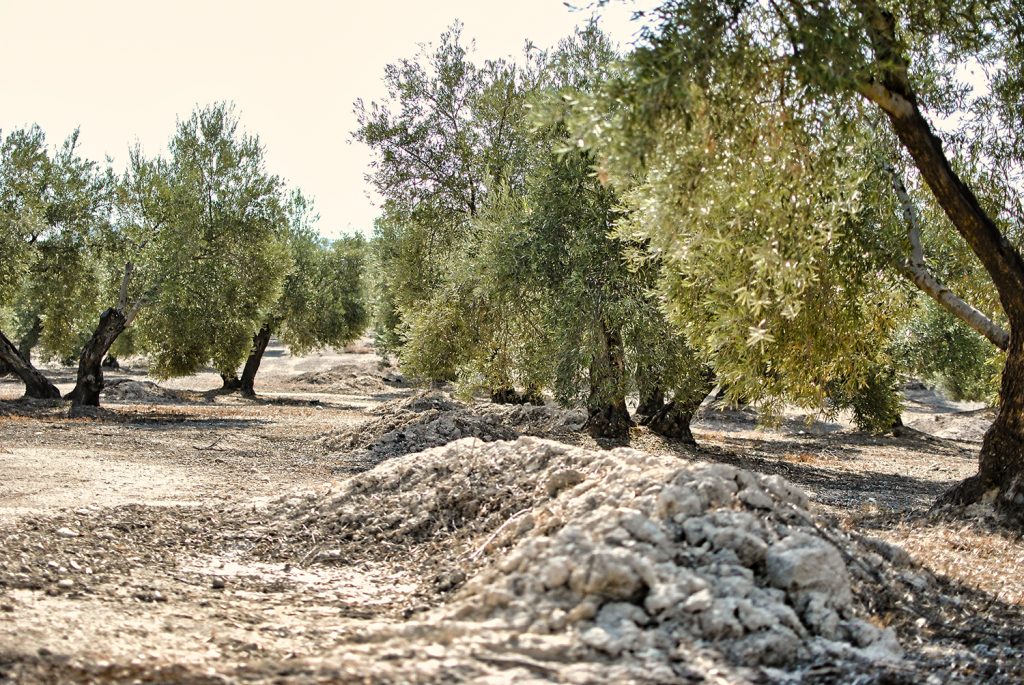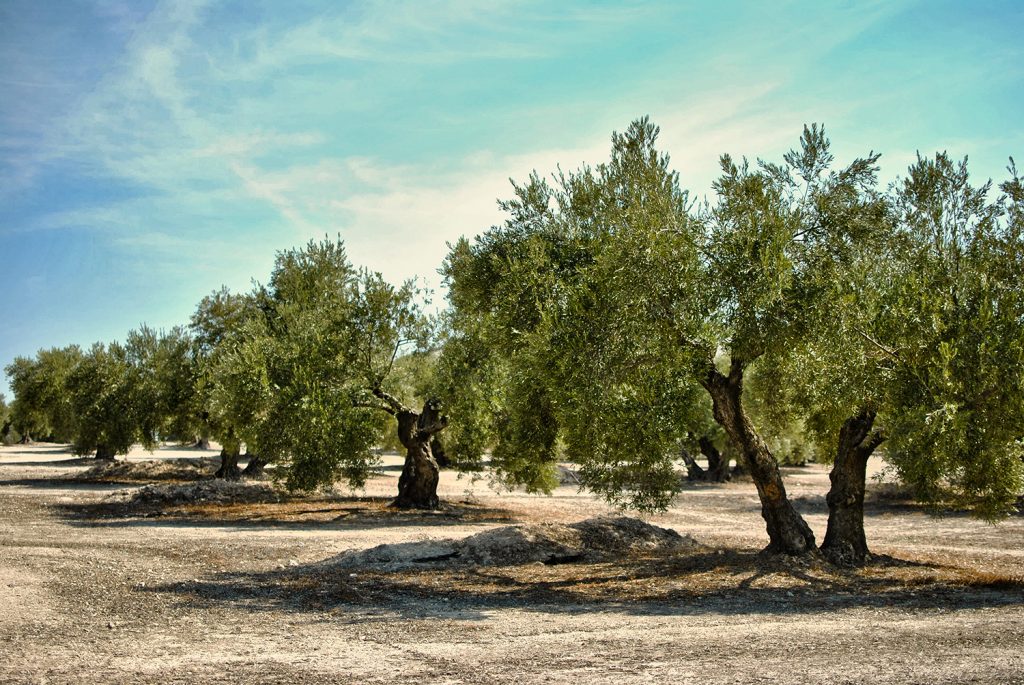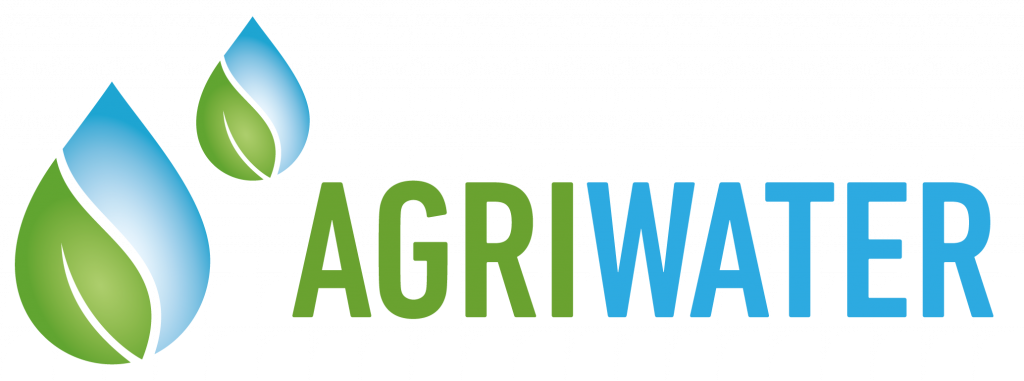Farm area/size of the organisation:
Number of workers:
Farm main activity:

This is a sloping piece of land where a pit is made in the upper part of each olive tree to accumulate rainwater so that the plant can use it after it infiltrates. to the pit capacity is approximately 1000-2000 litres, refillable each time it rains.
The pits are aligned on the slope to collect the runoff from the higher pits.
Considering it is a rainfed farm, the main objective was to collect rainwater, accumulating it where it could be useful for the plant.
In addition, the other aim was to reduce soil loss through erosion, which is very frequent given the stormy nature of many of the rainfall events.
This plot has an average slope of around 15%, which prevents rainwater from being retained and filtered properly.
In addition, it is a clay soil, with a lower infiltration capacity than sandy soils, which increases its limitations to optimise water use in storm events (a lot of water in a short time).
In recent years many farmers had developed this initiative on their farms, and the observation of the beneficial effects convinced Helena to try it.
She contacted a service provider that was carrying out the pits in the area. The low investment required in comparison to the expected benefit made her decision.
To accumulate water where it is available to the plant, the pit needs to be excavated at the top or bottom of the slope next to the tree, in the shape of a crescent.
To reduce runoff, the pits should be aligned so that what overflows from the higher pits flows to those immediately below.
As they are built with the soil (the material is excavated and reinforced by the shovel in a crescent-shaped), the pits can be damaged.
The action of rainwater, as well as those derived from the fieldwork and harvesting can affect the structure of the pit.
This measure is very simple and does not require a deep knowledge; it requires control during the process to ensure the correct structure and the necessary capacity to contain enough water.
In the same way, the pits must be aligned to collect the water that overflows from the basins located uphill.
The investment required to build the pits is more than affordable (initial €1100 + €500 maintenance every 2 years).
In fact, the benefit obtained is exponential to this investment. Following this measure, yields have stabilised and have increased by 30% compared to the previous records.
Before the construction of the pits, and due to the slope of the plot, multiple gullies emerged every year, dividing the farm into multiple sections.
This meant loss of soil, difficulties in carrying out operations and the need for maintenance to solve the resulting problems.
Pits are obstacles to water, intended to slow down and accumulate water, but they are also a constraint to tillage and harvesting.
They are not recommended on all soils, on all slopes, and in all climatic conditions.
The investment required to build the pits is more than affordable (initial €1100 + €500 maintenance every 2 years).
In fact, the benefit obtained is exponential to this investment. Following this measure, yields have stabilised and have increased by 30% compared to the previous records.
Before the construction of the pits, and due to the slope of the plot, multiple gullies emerged every year, dividing the farm into multiple sections.
This meant loss of soil, difficulties in carrying out operations and the need for maintenance to solve the resulting problems.
Pits are obstacles to water, intended to slow down and accumulate water, but they are also a constraint to tillage and harvesting.
They are not recommended on all soils, on all slopes, and in all climatic conditions.
The high slope of 15% is a constraint but also an opportunity to build a system of chained pits.
Clays make it difficult for water to infiltrate in storm events but can retain moisture for a longer period.
This texture also makes it possible to build stronger and more compact pits than with other soil types.
The formation of gullies is another problem that needs to be addressed.
It is a system that has not yet reached too many people to know its benefits.
Other farmers prefer tillage or ground covers as a way of increasing rainwater retention and infiltration capacity.
It requires some planning.
The technique can be learned if the equipment is available on the farm.
Dissemination of the benefits may attract more farmers as a measure to be applied on their farms.
These measures ensure water retention and reduced runoff, which facilitates soil conservation.
In addition, the use of solid mineral fertilisers has significant efficiency gains. The carry-over of these fertilisers is reduced, with greater utilisation by the crop and less contamination of aquifers.
It is an extremely simple measure affordable for all farmers. Its low investment and the resulting economic benefits justify its increasing diffusion.
It is important to be aware of its limitations and to be clear about the design to ensure sufficient retention capacity.


AGRIWATER project has been funded with the support from the European Commission, with the reference number 2020-1-CZ01-KA204-078212. The content of this website reflects the views only of the author, and the Commission cannot be held responsible for any use which may be made of the information contained therein.

At AGRIWATER we take the protection of your personal data very seriously. Our purpose is to protect the privacy of the data you provide us and to comply with the current regulations on the protection of personal data.
In compliance with the Act 3/2018 of 5 December on the Protection of Personal Data and Guarantee of Digital Rights transposing Regulation (EU) 2016/679, we inform you of the following information about our privacy and data protection policy:
The organization responsible of your data is Asociace soukromeho zemedelstvi Ceske republiky, ID E10133738. This is a non-governmental organization located in Prague, Czech Republic.
Address
Samcova 1177/1
11000
Praha 1
Telephone
+420266710413
+420266710414
Email contact
marketa.sandova@asz.cz
The legal basis for the treatment of your data is the consent of the data subject under article 6.1 a) of the Regulation, as well as the legitimate interest of the data controller under article 6.1 f) of the Regulation.
The data we request from you are adequate, relevant and strictly necessary and in no case are you obliged to provide them to us, but their non-communication may affect the purpose of the service or the impossibility of providing it.
Your data will be kept for the time required for the proper provision of the service offered, as well as to meet the responsibilities that may arise from it and any other legal requirement.
In the course of processing your data, Asociace soukromeho zemedelstvi Ceske republiky may share your data with:
On Projects Advising SL, as web management and maintenance service providers.
The controller retains the right to restrict the rights set forth in Article 23 of the EU Regulation, if such restriction is provided to safeguard, in particular fundamental rights and freedoms and is a necessary and proportionate measure.
If any interested party considers that their data are not being treated correctly, they can send their complaints to the following e-mail address; kristyna.strnadova@asz.cz, Asociace soukromeho zemedelstvi Ceske republiky.
The data subject declares to have acquired all this information.

A cookie is a file that is downloaded and executed on your computer, phone, or mobile device when you access certain web pages. Cookies allow a website, among other things, to store and retrieve information about user’s browsing habits and recognize the user depending on the information they contain and the way they use their computer.
Cookies do not harm your computer and are necessary to facilitate navigation.
Cookies are necessary for our website to work properly. The purpose of our cookies is to improve the user’s browsing experience. They can be used to remember your preferences (language, country, etc.) during navigation and on future visits.
The information collected in the Cookies also allows us to improve the website and adapt it to the individual interests of users, speed up searches, etc.
Analysis Cookies: These, if they are used properly by us or by third parties, allow us to quantify the number of users and thus perform the measurement and statistical analysis regarding the users’ usage of our service.
Advertising Cookies: These, if they are used properly by us or by third parties, allow us to manage as effectively as possible the supply of advertising space on the website, adapting the content of the advertisement to the content of the service requested or to the use you make of our website.
Our cookies do not store information about your personal identification, address, password, credit or debit card details, etc.
The information stored in the website’s cookies is used exclusively by us, apart from those identified below as “third party cookies”, which are used and managed by external entities to provide us with services to improve our own services and the user’s experience when browsing our website.
Third party cookies are mainly used to obtain statistics and to guarantee the payment operations are carried out.
Yes, firstly, you must disable cookies in your browser and, secondly, delete the cookies stored in your browser associated with this website.
You can restrict, block, or delete cookies from this website at any time by modifying your browser settings. This setting is different for each browser. For more details on the configuration of cookies in your browser, please consult your browser’s “Help” menu.
It is possible that some of the website’s features may no longer work if you disable cookies.
These Cookies are used to identify the user during the session, prevent the user from having to repeat authentication processes on the website, speed up some website processes, remember selections made during the session or on subsequent accesses, remember pages already visited, etc.
COOKIES
PURPOSE
DURATION
MANAGEMENT
User identification
They are used to identify and authenticate the user. They also contain technical data from the user session, such as connection timeout, session identifier, etc.
Session
AGRIWATER
Session identification
They identify the user’s http session. They are common in all web applications to identify requests from a user’s session.
Session
AGRIWATER
Navigation status
They help identify the user’s browsing status (login, first page, first access, scroll status, voting status, etc.).
Session
AGRIWATER
These Cookies obtain generic information about users’ accesses to the website (not the content of the same) to subsequently provide us with information about these accesses for statistical purposes.
COOKIES
PURPOSE
DURATION
MANAGEMENT
Google Analytics (__utma, __utmb, __utmc, __utmd, __utmv, __utmz, _ga…)
They allow website statistic’s tracking through the Google Analytics tool, which is a service provided by Google to obtain information about user access to websites. Some of the data stored is: number of times a user visits the website, dates of the user’s first and last visit, duration of visits, from which page the user accessed the website, which search engine was used or which link was clicked, from which part of the world the user accessed the website, etc. The information generated by the cookie about your use of the website will be directly transmitted and stored by Google Inc (a company located in United States). The configuration of these cookies is predetermined by the service offered by Google, so we suggest you consult the Google Analytics privacy page, for more information on the cookies it uses and how to disable them (keep in mind that we are not responsible for the content and accuracy of third-party websites).
Persistent
Third Parties